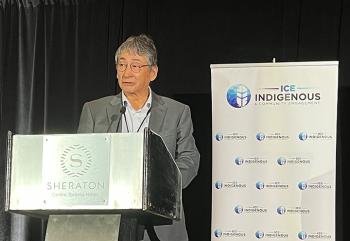Image Caption
Summary
Local Journalism Initiative Reporter
Windspeaker.com
Darrell Beaulieu believes it’s a balancing act for Indigenous communities to prosper in the mining industry.
Beaulieu is the president and CEO of Denendeh Investments Incorporated, an Indigenous- owned corporation representing the 27 First Nations in the Northwest Territories. He’s also president of the Denendeh Mining and Exploration Company (DEMCo).
Beaulieu was in Toronto in early April as speaker at the two-day “Indigenous Led Projects Forum” held at the Sheraton Centre Toronto Hotel.
Beaulieu was part of an opening-day session on April 2 titled Indigenous Ownership.
“There was a lot of mining and exploration over the last 200 years,” Beaulieu said. “But (Indigenous) people were never really involved.”
Yes, Indigenous people were occasionally hired to do the odd job in the mining industry, he said, “but 25-, 30 years ago, Indigenous people realized they were not getting a fair share of revenue being generated from mining in their territories. As our lives progressed, more Indigenous participation came in and people started creating businesses.”
It was just over a decade ago that Indigenous people in the Northwest Territories realized they needed to not only participate in mining development but also take ownership of projects.
At times that can be easier said than done, he said.
“Indigenous people, like other Canadians, were conflicted. We want to safeguard our land, our water, animals, culture, our communities. But at the same time, we want to train our people. We want employment. We want economic development. We want business. And we want to improve the economic conditions for our community. So, it’s a balancing act,” Beaulieu said.
In 2014, Dene chiefs in the Northwest Territories passed a historic resolution, which was reaffirmed two years later. It stipulated that the Dene people in the territory promote and support the concept of working together, something that had not been regularly done in the past.
DEMCo officials continually have to educate community members that resource exploration and development is necessary.
“Even though we are 100 per cent Indigenous owned, you’ve got to realize we have 27 communities and some of the projects are close to specific communities that we need to continue that conversation,” Beaulieu said. “And it’s not something new. People have done that for thousands and thousands of years when they go fishing and hunting and trapping. We all talk amongst each other and say this is what the intent is and how do we make that happen.
“The objective is to increase the capacity in the communities, not only in engaging them, benefitting from them, but actively participating and capitalizing on those opportunities. And to increase investment and collaboration in this sector. And to create a model for Indigenous participation. So, we think that model can be used not only there but can be expanded to other regions and territories and maybe even interprovincially and across Canada.”
The Northwest Territories is rich in gold, diamonds, zinc, lead and copper.
Beaulieu said there are numerous benefits to be gained from the industry, including “own-source revenues, opportunities for new business, employment, training, local Indigenous knowledge of the environment, sustainable mining practices, local transportation and energy infrastructure and creating certainty and increasing investments.”
Plus, younger generations will be among those reaping the rewards.
“The youth are very important to the Indigenous communities,” Beaulieu said. “They’ll be able to learn new skills in the minerals sector.”
Jason Gauthier, who is serving his fourth term as the chief of the Missanabie Cree First Nation in northern Ontario, was also a panelist for the Indigenous Ownership session.
Gauthier talked about the advice he has for industry partners who want to be involved with projects with Indigenous communities. He said early engagement is key to avoid confusion later on.
“There has to be trust built,” Gauthier said. “There has to be early meetings. And what I mean by that is meet with the First Nations. When I say early, send out the information, review the information with the community so that they are aware. The way you are going to get consent on any project is if they are going to understand it. As long as they fully understand the project, there’s a better chance it’s accepted.”
Local Journalism Initiative Reporters are supported by a financial contribution made by the Government of Canada.

